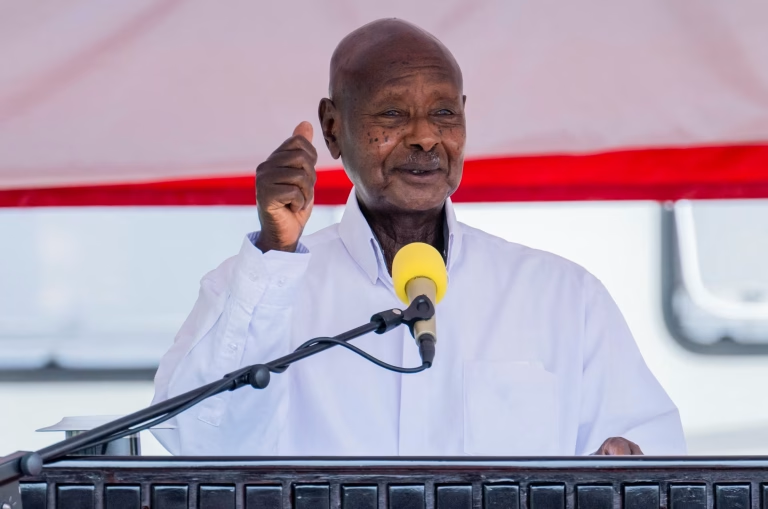Ugandan President Yoweri Kaguta Museveni has reignited regional debate after declaring that landlocked Uganda has a rightful claim to the Indian Ocean, citing both historical and economic arguments. During a radio talk show at Mbale State Lodge on November 10, 2025, Museveni argued that Uganda’s lack of direct access to the ocean is a colonial injustice that continues to limit the nation’s economic growth. Using a “condominium analogy,” he likened East African countries to tenants sharing a single building, insisting that Uganda deserves shared access to the region’s maritime resources just as much as its coastal neighbors.
Museveni’s Vision of Shared Ocean Access
In his remarks, President Museveni asserted that Uganda, though landlocked, is part of a shared East African geographic and economic system that naturally entitles it to access the Indian Ocean. “Just because Uganda sits in the inner rooms of the condominium does not mean we don’t have ownership of the balcony,” Museveni explained, arguing that the region must rethink its borders and resource distribution.
He went on to criticize colonial borders, calling them arbitrary divisions that ignored traditional trade routes and cultural ties. Museveni emphasized that pre-colonial Africa operated through interconnected trade systems where inland kingdoms exchanged goods freely with coastal merchants. The establishment of colonial territories, he said, disrupted these systems and left countries like Uganda dependent on external trade routes.
Museveni’s statement comes at a time when Uganda continues to rely heavily on Kenya’s Port of Mombasa, through which it handles over 80 percent of its exports and imports. This dependence, he argued, creates an unequal dynamic within the East African Community (EAC), where landlocked nations bear the burden of higher logistics costs and external trade barriers.
Criticism of Colonial Borders and Historical Injustices
Museveni’s assertion reflects a deep frustration shared by many African leaders who view colonial-era boundaries as obstacles to regional development. He labeled the borders drawn during the Berlin Conference of 1884–85 as “illogical and exploitative,” stating that they were designed to divide the continent and restrict internal trade.
According to Museveni, the legacy of colonialism continues to affect modern Africa’s economic landscape. “The Europeans carved Africa like a cake without thinking of its people. We still suffer from that division,” he said. Uganda, he argued, should not have to depend entirely on Kenya or Tanzania for maritime access, as this dependency limits sovereignty and economic growth.
This is not the first time Museveni has challenged post-colonial boundaries. Throughout his presidency, he has consistently advocated for African integration, arguing that unity and shared development are the only ways to reverse the damage caused by European colonialism. His latest comments add weight to his long-held vision of a federated East Africa, where nations collaborate on infrastructure, trade, and defense for collective prosperity.
Economic Dependence and the Mombasa Dilemma
Uganda’s reliance on the Port of Mombasa has long been a strategic and economic concern. The port serves as Uganda’s lifeline for petroleum imports, agricultural exports, and industrial goods. However, bureaucratic bottlenecks, congestion, and rising transport costs have made the dependency increasingly costly. Museveni pointed out that this system undermines Uganda’s independence, forcing it to rely on infrastructure controlled by another state.
While Uganda has developed alternative routes, including partnerships with Tanzania’s Port of Dar es Salaam and the construction of road and rail links through the Central Corridor, Mombasa remains the primary hub for Ugandan trade. Museveni argued that this arrangement is unsustainable and that East African countries should treat the Indian Ocean as a shared economic zone, not as a national asset belonging exclusively to coastal states.
He also referenced the Uganda-Kenya Standard Gauge Railway project, which has faced repeated delays due to funding and policy disagreements. The stalled project, he noted, reflects the broader challenge of regional cooperation and the need for stronger political will to achieve economic integration.
Warning of Future Conflicts Over Access and Inequality
In a tone that mixed frustration with foresight, Museveni warned that future wars in Africa could arise not from ideology or ethnicity, but from economic inequality and access to shared resources. He cited the persistent tensions surrounding borders, trade corridors, and energy infrastructure as potential flashpoints.
“If we continue to treat access as a privilege and not a right, future generations may fight over it,” he said. Museveni underscored that regional conflicts often begin with economic grievances that escalate when left unresolved. He called on East African leaders to address these structural inequalities before they threaten the peace and unity the region has worked to build.
Museveni’s warning mirrors the realities of Africa’s history, where disputes over natural resources, water rights, and borders have fueled instability. He referenced earlier tensions between Uganda and Kenya over fuel supply routes and customs procedures as examples of how small disagreements can strain larger partnerships.
Push for East African Integration and Unity
President Museveni’s remarks also serve as a renewed call for deeper East African integration under the East African Community (EAC) framework. He emphasized that cooperation in infrastructure, trade, and governance should go hand in hand with shared access to natural resources, including maritime zones.
The EAC, which now includes Uganda, Kenya, Tanzania, Rwanda, Burundi, South Sudan, the Democratic Republic of Congo, and Somalia, represents one of Africa’s most ambitious regional blocs. Museveni has consistently been among its strongest advocates, arguing that a united East Africa could become a global economic powerhouse.
“Integration is not just about trade or passports—it’s about justice. No member of this community should feel locked out of opportunity,” he said. He urged the EAC to adopt a maritime cooperation framework that would guarantee landlocked states fair access to ports, shipping routes, and coastal investment opportunities.
Museveni also stressed that integration would prevent external powers from exploiting African divisions. “When we act as separate, weak states, others control our destiny. But when we unite, we can control our future,” he said.
Regional and Diplomatic Reactions
Museveni’s comments have triggered mixed reactions across East Africa. Supporters view his stance as a bold reminder of Africa’s unfinished decolonization agenda. Many Ugandan economists and historians have praised him for highlighting the structural barriers that hinder economic independence. Some Kenyan commentators, however, have described his analogy as “symbolic but unrealistic,” arguing that legal and logistical realities make such claims impractical.
Political analysts see Museveni’s statement as part of a broader regional conversation about shared sovereignty and collective resource management. They note that with global trade shifting toward regional blocs, East Africa must strengthen its internal economic corridors or risk being left behind.
Critics, on the other hand, warn that Museveni’s rhetoric could be misinterpreted as confrontational. While his intention appears rooted in unity, references to “future wars” may unsettle neighboring governments that interpret the remarks as territorial ambition. Nonetheless, Uganda’s Ministry of Foreign Affairs clarified that the president’s comments were conceptual and aimed at encouraging economic justice, not border revisionism.
Historical and Legal Perspectives
Museveni’s assertion also aligns with principles recognized under international law. The United Nations Convention on the Law of the Sea (UNCLOS) guarantees landlocked countries the right of access to and from the sea for trade purposes. These provisions obligate coastal states to facilitate transit through mutually agreed arrangements. Museveni’s argument, therefore, resonates with these global norms, though his emphasis extends beyond legality into moral and historical entitlement.
From a historical lens, Uganda’s current dependency on foreign ports mirrors patterns across Africa, where inland nations remain reliant on external gateways for trade. Similar challenges exist in Zambia, Malawi, and Ethiopia, which have also called for regional cooperation to ensure fair access to maritime routes.
Museveni’s reference to the “condominium” model also draws from past attempts at shared governance, such as the Anglo-Egyptian Condominium of Sudan, where two states managed a territory jointly. In Museveni’s interpretation, this analogy represents collective stewardship of shared resources rather than physical annexation.
A Call for Pan-African Reawakening
At its core, Museveni’s declaration underscores his long-standing Pan-African ideology—a vision that calls for African unity, self-reliance, and the dismantling of neocolonial economic systems. He argued that Africa’s divisions benefit foreign interests that control trade corridors, shipping routes, and resource extraction. By reclaiming access to the Indian Ocean as a shared East African right, he seeks to reframe sovereignty as a collective rather than an individual national concept.
He called upon African youth and intellectuals to challenge outdated systems that limit continental cooperation. “Africa cannot remain a collection of small, disconnected economies. We must think as one,” he said. His remarks echoed earlier speeches where he urged the African Union and regional blocs to pursue economic liberation through infrastructure unity rather than dependency on external aid.



















